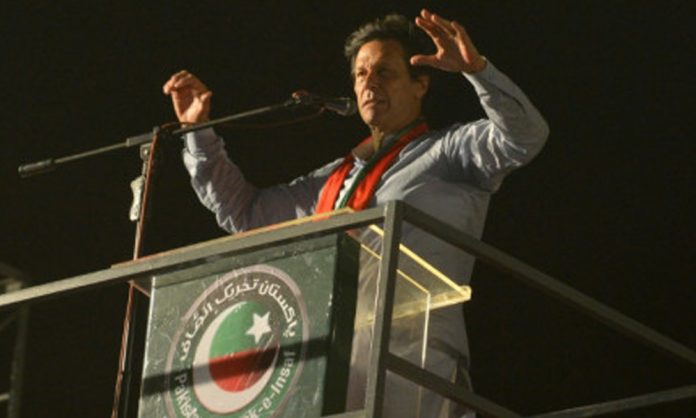Pakistani lawmakers will vote for a new prime minister Friday, with World Cup cricket hero and election winner Imran Khan expected to become the nuclear-armed country’s new leader-in-waiting after weeks of working to form a coalition.
Pakistani lawmakers will vote for a new prime minister Friday, with World Cup cricket hero and election winner Imran Khan expected to become the nuclear-armed country’s new leader-in-waiting after weeks of working to form a coalition.
A simple majority in the vote, due to take place in the lower house of parliament on Friday afternoon, will bring Khan one step closer to power ahead of a swearing-in ceremony set for Saturday.
Khan won the July 25 election, but did not have enough seats for an outright majority, forcing him to partner with smaller parties and independents in order to form a government.
His only challenger is Shahbaz Sharif, leader of the ousted Pakistan Muslim League-Nawaz (PML-N), who is not believed to have the necessary votes.
The election was branded “Pakistan’s dirtiest”, after widespread claims in the months leading up to it that the powerful military was trying to fix the playing field against the PML-N and in Khan’s favour.
Rival parties have alleged “blatant” vote-rigging. The army and Khan have denied the claims.
Khan’s victory represents an end to decades of rotating leadership between the PML-N and the Pakistan Peoples Party (PPP), punctuated by periods of military rule.
He and his Pakistan Tehreek-e-Insaf (PTI) party campaigned on promises to end widespread graft while building an “Islamic welfare state”.
The party has already formed a government in its stronghold of Khyber Pakhtunkhwa province, and an alliance with regional parties in the southwestern province of Balochistan.
It is expected to form a coalition government in powerful Punjab province, formerly a PML-N stronghold, in coming days. Sindh province remained in the hands of the Pakistan Peoples Party (PPP).
PTI candidates were also voted Speaker and Deputy Speaker of the National Assembly this week, putting Khan in a strong position to carry forward his legislative agenda.
Pakistani lawmakers will vote for a new prime minister Friday, with World Cup cricket hero and election winner Imran Khan expected to become the nuclear-armed country’s new leader-in-waiting after weeks of working to form a coalition.
Pakistani lawmakers will vote for a new prime minister Friday, with World Cup cricket hero and election winner Imran Khan expected to become the nuclear-armed country’s new leader-in-waiting after weeks of working to form a coalition.
A simple majority in the vote, due to take place in the lower house of parliament on Friday afternoon, will bring Khan one step closer to power ahead of a swearing-in ceremony set for Saturday.
Khan won the July 25 election, but did not have enough seats for an outright majority, forcing him to partner with smaller parties and independents in order to form a government.
His only challenger is Shahbaz Sharif, leader of the ousted Pakistan Muslim League-Nawaz (PML-N), who is not believed to have the necessary votes.
The election was branded “Pakistan’s dirtiest”, after widespread claims in the months leading up to it that the powerful military was trying to fix the playing field against the PML-N and in Khan’s favour.
Rival parties have alleged “blatant” vote-rigging. The army and Khan have denied the claims.
Khan’s victory represents an end to decades of rotating leadership between the PML-N and the Pakistan Peoples Party (PPP), punctuated by periods of military rule.
He and his Pakistan Tehreek-e-Insaf (PTI) party campaigned on promises to end widespread graft while building an “Islamic welfare state”.
The party has already formed a government in its stronghold of Khyber Pakhtunkhwa province, and an alliance with regional parties in the southwestern province of Balochistan.
It is expected to form a coalition government in powerful Punjab province, formerly a PML-N stronghold, in coming days. Sindh province remained in the hands of the Pakistan Peoples Party (PPP).
PTI candidates were also voted Speaker and Deputy Speaker of the National Assembly this week, putting Khan in a strong position to carry forward his legislative agenda.
He will face myriad challenges including militant extremism, water shortages, and a booming population negating growth in the developing country, among others.
Most pressing will be a looming economic crisis, with speculation that Pakistan will have to seek a bailout from the International Monetary Fund.
He will also have to contend with the same issue as many of his predecessors: how to maintain a balance of power in civil-military relations.
In the West, Khan is often seen as a celebrity whose high-profile romances were tabloid fodder, but at home he cuts a more conservative persona as a devout Muslim who believes feminism has degraded motherhood.
Known in Pakistan as “Taliban Khan” for his calls to hold talks with insurgents, he increasingly catered to religious hardliners during the campaign, spurring fears his leadership could embolden extremists.
He will face myriad challenges including militant extremism, water shortages, and a booming population negating growth in the developing country, among others.
Most pressing will be a looming economic crisis, with speculation that Pakistan will have to seek a bailout from the International Monetary Fund.
He will also have to contend with the same issue as many of his predecessors: how to maintain a balance of power in civil-military relations.
In the West, Khan is often seen as a celebrity whose high-profile romances were tabloid fodder, but at home he cuts a more conservative persona as a devout Muslim who believes feminism has degraded motherhood.
Known in Pakistan as “Taliban Khan” for his calls to hold talks with insurgents, he increasingly catered to religious hardliners during the campaign, spurring fears his leadership could embolden extremists.








































